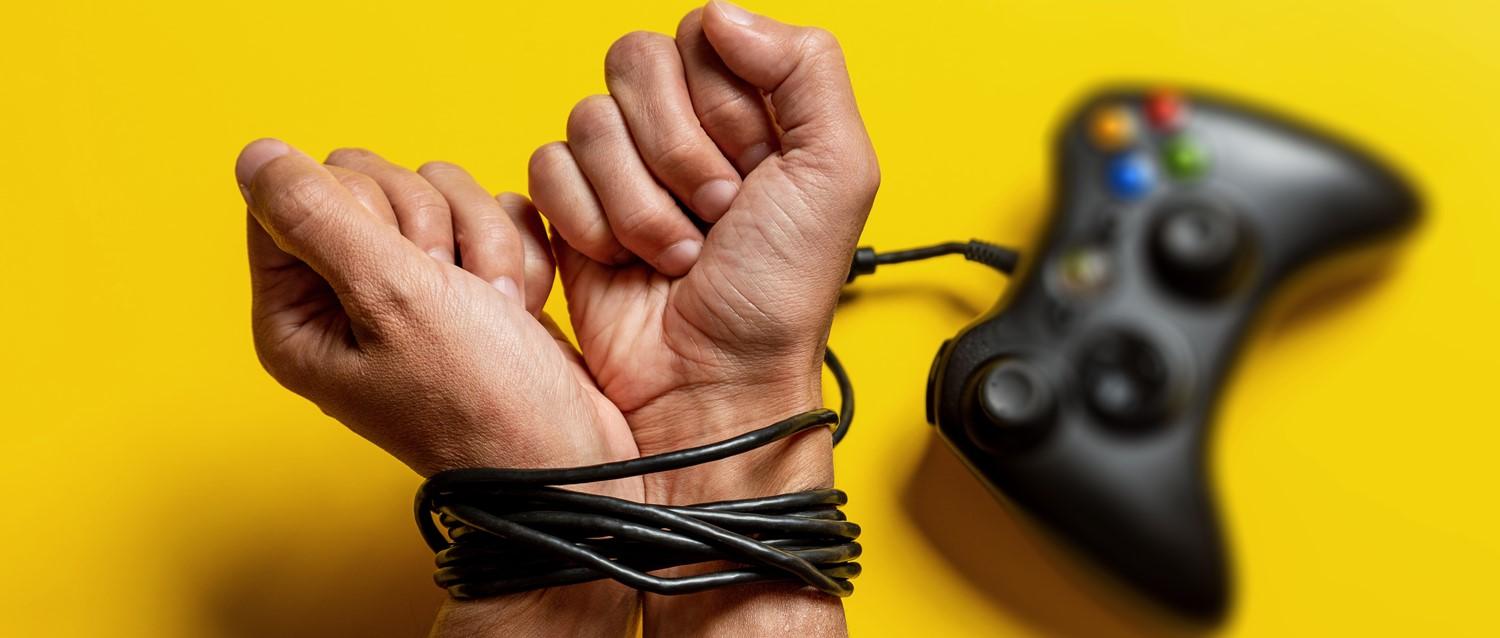
Level up your real life: 6 health tips every gamer needs to know
Peer reviewed by American Heart Association Authored by Michael MerschelOriginally published 7 Jul 2025
- DownloadDownload
- Share
- Language
- Discussion
In video games, all players usually need to do to stay healthy is to drink the occasional healing potion or perhaps grab a floating heart. Avoiding zombies and killer aliens helps, too.
In real life, deadly monsters may be less common, but maintaining health is trickier. Luckily, it doesn't take a secret hack to stay well while playing, experts say - and some of their advice might even help you boost your gameplay.
In this article:
Continue reading below
Gaming has its benefits
Dr Joanne Donoghue, New York Institute of Technology College of Osteopathic Medicine, Old Westbury, USA says some aspects of gaming can be good for you.
"There's definitely a plus side," says the Director of Clinical Research, who has led several studies on professional gamers' health. "Some action video games have been shown to improve reaction time and may help with multitasking. And unlike gamers from earlier eras, modern players sitting with their headphones and microphones are 'live' and interacting with a lot of people at one time. So there is a social component."
Dr Jason Nagata, an associate professor of paediatrics at the University of California, San Francisco, USA has studied the effects of screen time, including video games, on children and teenagers.
He explains that digital media is not inherently good or bad - there are some downsides, but also some benefits.
Understanding the issues
The health concerns linked to gaming are both broad and specific - for starters, there are only 24 hours in a day.
Nagata says: "If you're sitting on a couch playing your video game for however many hours, that's basically time that you're not outside, walking, being physically active."
Neither are you doing anything else that's good for your physical or mental health.
He adds that excessive video game time also can be associated with lack of sleep and poor nutrition, which can affect your heart health.
Donoghue's research published in 2019 in BMJ Open Sport and Exercise Medicine showed that competitive gamers, also called esports athletes, frequently report health issues1.
These include:
Neck, back, hand and wrist pain.
Donoghue led another study, published in April in the International Journal of Environmental Research and Public Health.2
This showed men who were competitive gamers had considerably higher body fat levels and significantly less muscle mass than non-competitive gamers with the same body mass index (BMI).
Donoghue says: "When you're sedentary, and you're not putting in the hours of exercise or strength training, essentially your muscles are atrophying."
Meanwhile, players' heart rates can soar in an unhealthy stress response. Combining stress with immobility may raise your chance of developing a type of dangerous blood clot called deep vein thrombosis - which typically forms in the legs, arms or pelvis.
Gamer's thrombosis
'Gamer's thrombosis' has been documented in players as young as 12 years old. In 2004, a 24-year-old South Korean who played a game for 80 hours straight died after a blood clot travelled to his lungs.
Prolonged sitting at a computer at least 10 hours in a 24-hour period - and at least two hours at a time without getting up - has been associated with nearly triple the likelihood of developing dangerous blood clots. This chance can rise for each hour seated without getting up.
Video games and mental health
Video games are linked to mental health as well. Nagata led a review of data collected by the Adolescent Brain Cognitive Study that looked at the effects of screen time and social media use, including video games, on more than 11,000 teenagers.3
The analysis by Nagata and his colleagues was published in the journal Current Opinion in Pediatrics in April. The ABCD study showed that greater screen time is associated with depression, anxiety and other issues.4
The social nature of gaming can also expose teens to issues such as cyberbullying. And while video game addiction is not an official diagnosis, Nagata said, psychologists acknowledge that some gamers can show signs of addiction, including withdrawal symptoms when not playing, loss of interest in other activities and a general loss of control related to video gaming.
Luckily, six simple steps can help prevent many gaming-related problems.
Continue reading below
6 easy ways to stay healthy while gaming
1. Move something besides your thumbs
A little exercise can make a difference.
Donoghue and her colleagues have measured the effects of taking an hourly 6-minute walking break on a small group of competitive gamers.
In one study, published in 2024 in the American Journal of Physiology-Heart and Circulatory Physiology, gamers who took such a break saw significant improvement in their blood flow volume and velocity. Wearing sock-like compression sleeves also provided a small benefit.5
In that study, about two-thirds of the participants believed that the break had helped their gaming performance.5
In a separate study Donoghue led, published in 2021 in BMJ Open Sport and Exercise Medicine6, competitive players who took a walk break improved cognitive performance, with shorter planning and solution times on problem-solving tasks. Other researchers, who published in Medicine and Science in Sports and Exercise in 2020, found that a short bout of intense exercise improved video game performance7.
Which all underpins Donoghue's advice to gamers - set a timer, take breaks and stay active.
"You've got to get the exercise in," he says. "You've got to move your body. The body is meant for motion, and muscles atrophy, no matter what age you're at."
It's recommended you get at least 150 minutes a week of moderate-intensity aerobic exercise or 75 minutes a week of vigorous aerobic activity - or a combination of both. The guidelines also discourage people from being sedentary and suggest they participate in moderate-to high-intensity activities to strengthen muscles at least two days per week.
2. Fuel up carefully
In research on young teenagers, more time gaming has been associated with a less nutritious diet and a higher BMI.
Nagata says: "Some of the potential reasons for that are that if you are eating while you're distracted, you're more likely to eat junk foods.
"You're also less likely to pay attention to your hunger or fullness cues, so you might eat more than you otherwise would if you were not distracted in front of screens. So avoid mixing eating and gaming."
He adds that high-caffeine energy drinks have become part of gaming culture. However, such drinks have been linked to a higher likelihood of health issues - such as heart rhythm issues and cardiac arrest.
A consortium of health groups, including the American Heart Association and American Academy of Pediatrics, issued recommendations in January that say caffeinated beverages are not recommended for children younger than 18.8
3. Try active games
Some games do encourage motion.
Nagata says these 'exergames' can help players avoid being sedentary.
He explains: "Some of those associations that we see related to weight gain and poor eating are probably not the case when you're exergaming or moving around a little bit more."
4. Turn off screens before bed
According to Nagata, when people play video games at night right before bedtime, that can take away from the time they have to sleep.
In a 2024 survey by the Pew Research Center, 41% of teens said video games had harmed their quality of sleep9. A study published in March in Frontiers in Psychiatry found that among Norwegian college students, an hour of screen time before bed was associated with a loss of 24 minutes of sleep10.
The AAP11 recommends turning off screens an hour before bedtime and keeping video games in common areas to help parents keep an eye on use.
5. Monitor and get buy-in
Parents need to be aware that some games just aren't suitable for kids.
Donoghue says: "I don't think they realise how interactive they are and how toxic they can become. Parents should pay attention to ratings, which can help keep inappropriate games away from children."
Nagata advises that it's important to get buy-in from children on restrictions - but pick your battles wisely. For him, the most important health-related limits would be limiting games at meals and bedtime.
The AAP recommends having a family media plan.
Nagata describes this as a set of guidelines that is individualised to your household and that can take into account your kids' ages, what devices you have, and other factors. It should involve regular conversations and check-ins with the whole family.
He adds that parents can start by modelling good behaviour. Parents' own media use is a big predictor of video game time in kids.
He says: "If you are going to make rules about household screen use, it's important that you follow them and act as a good example for your kids."
6. Have fun, but check yourself
Video games are about entertainment, leisure and recreation.
"If they are fun for you, and it's not displacing other things, then it's fine to play them in moderation," says Nagata.
But every so often, he advises you ask yourself how you're feeling.
"If your reply is, "Oh, wow, the last hour has passed – I don't know what happened, and I kind of feel tired and cranky," then it might be time to also ask, "What else could I be doing?" Maybe go outside. Maybe take a walk or meet up with some friends in person."
He concludes by saying that games are supposed to bring you joy.
"If your answers indicate otherwise," he warns. "Then those are reasons to think, "OK, maybe I should stop this or do something differently tomorrow.""
This article is published with kind permission of the American Heart Association, which has been striving to save and improve lives for more than 100 years.
Patient picks for Online and social media

Healthy living
How to spot the signs of gaming addiction in children
Nearly half of parents are worried that their children are spending too much time playing online games. There are also concerns over violent games affecting their sleep and making children less sociable. As technology develops and becomes more accessible to minors, it's important that parents and guardians are able to spot the signs of gaming addiction before it gets out of control.
by Emily Jane Bashforth

Healthy living
How to talk to your child about social media
When the coroner's report on Molly Russell - the 14-year-old who died from an act of self-harm -confirmed that social media had played a part in her death, it showed that social media content really can damage the mental health of our children and teenagers. How can parents and carers protect their children from this ever-evolving threat?
by Gillian Harvey
Further reading
7. De Las Heras at al: Exercise Improves Video Game Performance: A Win–Win Situation
8. Healthy Eating Research: Healthy Beverage Consumption in School-Age Children and Adolescents
9. Pew Research Center: Teens and Video Games Today
11. Claire McCarthy: Unhealthy Video Gaming: What Parents Can Do to Prevent It
Article history
The information on this page is peer reviewed by qualified clinicians.
Next review due: 9 Jul 2028
7 Jul 2025 | Originally published
Authored by:
Michael Merschel
Peer reviewed by
American Heart Association

Ask, share, connect.
Browse discussions, ask questions, and share experiences across hundreds of health topics.

Feeling unwell?
Assess your symptoms online for free